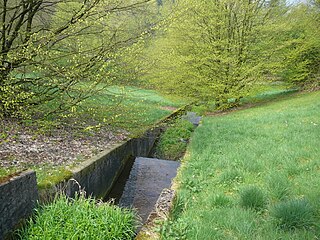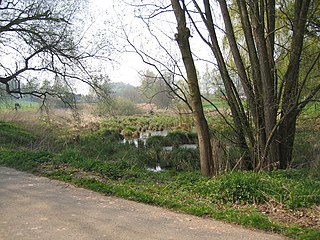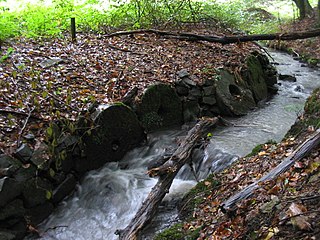
Mausbach is a small river of North Rhine-Westphalia, Germany. It is 1.2 km long and flows into the Vichtbach as a right tributary near Stolberg. It is one of four streams in North Rhine-Westphalia named Mausbach.

Alte Emscher is a river of North Rhine-Westphalia, Germany. It flows into the Rhine near Hamborn (Duisburg). It is the former lower course of the Emscher.

Arbach is a river of North Rhine-Westphalia, Germany. It is a right tributary of the Wildenbach.
Asbeke is a river of North Rhine-Westphalia, Germany. It flows into the Eickumer Mühlenbach near Herford.

Auer Bach is a small river of North Rhine-Westphalia, Germany. It flows into the Wupper in Wuppertal.

Belgenbach is a river of North Rhine-Westphalia, Germany. It flows into the Rur near Monschau.

Bentgraben is a small river of North Rhine-Westphalia, Germany. It flows into the Werre near Bad Salzuflen.
Bermecke, also known as Kloßsiepen, is a river of North Rhine-Westphalia, Germany. It is a left tributary of the Möhne.
Bieke is a river of North Rhine-Westphalia, Germany. It is 4.4 km long and a tributary of the Bigge.

The Brebach is a river of North Rhine-Westphalia, Germany. It is 3.5 km long and is a left tributary of the Spreeler Bach.

Buchheller is a river of North Rhine-Westphalia, Germany. It is 8.9 km long and flows into the Heller near Burbach.

Darmühlenbach is a river of North Rhine-Westphalia, Germany. It is 7.8 km long and flows into the Else near Bünde.
Erlenbach is a small river of North Rhine-Westphalia, Germany. It is 4.7 km long and flows into the Bever near Radevormwald.
Fülsenbecke is a small river of North Rhine-Westphalia, Germany. It flows into the Aa near Brilon.
Große Dumecke is a small river of North Rhine-Westphalia, Germany. It is 2.9 km long and flows into the Möhne near Warstein.

Habighorster Bach is a small river of North Rhine-Westphalia, Germany. It is 2.8 km long and flows into the Gewinghauser Bach near Bünde.

Kaltenbach is a small river of North Rhine-Westphalia, Germany. It is 2.2 km long and flows into the Wupper at a left tributary near Solingen.

Klosterbach is a small river of North Rhine-Westphalia, Germany. It is 5.7 km long and is a right tributary of the Schwarzbach. It is one of four streams in North Rhine-Westphalia named Klosterbach.
Kühlbach is a river of North Rhine-Westphalia, Germany. It is 7.3 km long and flows into the Veybach as a right tributary near Satzvey. It is one of three rivers and streams in North Rhine-Westphalia named Kühlbach.

Linnenbeeke is a small river of North Rhine-Westphalia, Germany. It it is 6.8 km long and flows into the Forellenbach as a right tributary near Vlotho.














